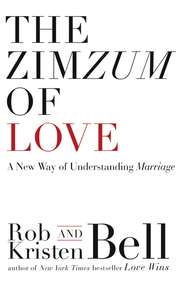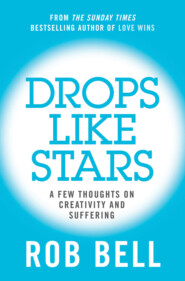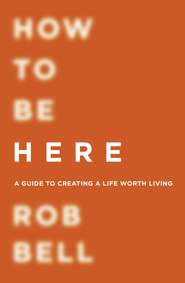По всем вопросам обращайтесь на: info@litportal.ru
(©) 2003-2024.
✖
The Complete Rob Bell: His Seven Bestselling Books, All in One Place
Автор
Год написания книги
2018
Настройки чтения
Размер шрифта
Высота строк
Поля
When we deny the spiritual dimension to our existence, we end up living like animals. And when we deny the physical, sexual dimension to our existence, we end up living like angels.
And both ways are destructive, because God made us human.9 (#litres_trial_promo)
The tension here cannot be resolved easily, if ever. In the first century in the Asia Minor city of Ephesus, there was a religious group that was aware of the powerful sexual forces that we carry within us.10 (#litres_trial_promo) They observed that sex can get us into lots of trouble. Which we’d probably all agree with. Their conclusion was that because sex is so dangerous, it should just be avoided altogether. But to avoid sex, you need to avoid romance and affection and all that comes with them, and of course you’re going to need to eliminate marriage altogether. So this religious group forbade their followers from getting married.
They had a similar practice in regard to food. There were foods sold in the markets of the cities that had been offered to the local gods in the local temples as part of their worship rituals. The leaders of this religion decided that if something had been offered to a god they didn’t believe in, they wouldn’t eat it. Their response was to make lists of foods the members of their religion could and couldn’t eat.
Do you see the problem with their religion? Anytime things got ethically complicated, anytime the waters got even slightly murky, anytime there was something to be held in tension, they simply avoided the issue.
Instead of dealing with the ambiguity and the lack of clarity that many things in life can bring when a person first encounters them, they would simply throw the whole thing out.
This is where the first Christians come in. One of them, a man named Paul, who wrote many letters to the early churches, addresses this issue in a letter to the Christians at Ephesus. He warns them about those who “forbid people to marry and order them to abstain from certain foods,” telling them that those are things “God created to be received with thanksgiving by those who believe and who know the truth.”11 (#litres_trial_promo)
Paul’s point is brilliant. He makes a distinction between the inherent good of something and the abuse of it. People may have seriously distorted the good gift that sex is or offered food to gods that lead people into destructive ways of living, but that doesn’t mean that sex or food are inherently wrong. He continues, “For everything God created is good, and nothing is to be rejected if it is received with thanksgiving, because it is consecrated by the word of God and prayer.”12 (#litres_trial_promo)
He insists that everything God created is good, and we come to see this through what he calls “the word of God and prayer,” which is the hard work of study and reflection and meditation and discussion and debate. The temptation is always to avoid things that are difficult and complex. To go around them rather than through them.
Think about the parents of a junior high girl who has just hit puberty and all of a sudden her body has changed in some significant ways, and she’s being noticed in ways she wasn’t before and now she’s starting to notice that she’s being noticed. Her parents have to talk to her about all of this. They have to wade into the complexity and confusion and mixed messages that our culture is sending their daughter. If they indulge one way, telling her to use her body to get what she needs and encouraging her to draw as much attention to her body as she can, they’re encouraging her to act like an animal. But if they ignore these changes and hope the whole thing just goes away, they’re sending her an equally destructive message. They’re treating her like an angel. Her sexuality and her body and her beauty are good things. They were given to her by God. Her parents must embrace this and all that comes with it. And they have to teach her how to embrace it in an honorable, dignified way. They must live in the tension and then show her how to do the same.
And so Paul addresses this religious group with their narrow and restrictive lists, claiming that they are actually working against God’s purposes in the world. Things that God has made, things that are good, things that God created to be enjoyed, are being ignored and avoided because these religious people refuse to live in the tension.
And now for the opposite end of the spectrum. A friend of mine recently interviewed Hugh Hefner, founder of the Playboy empire, for a book she was writing.13 (#litres_trial_promo) They did the interview sitting on a couch in the Playboy mansion in Los Angeles. As he answered questions about his upbringing, he said, “I was raised in a setting in which [sex] was for procreation only and the rest was sin.”
What’s he saying, essentially? He was raised by parents pretending to be angels.
He continued later in the interview: “Our family was Prohibitionist, Puritan in a very real sense. . . . Never hugged. Oh, no. There was absolutely no hugging or kissing in my family. There was a point in time when my mother, later in life, apologized to me for not being able to show affection. That was, of course, the way I’d been raised. I said to her, ‘Mom, you couldn’t have done it any better. And because of the things you weren’t able to do, it set me on a course that changed my life and the world.’ ”
It isn’t difficult to understand his reaction to an angelic upbringing. He was denied something central to what it means to be human: affection. And so the rest of his life has been a journey to the other end of the spectrum.
In reaction to denial, people often head to the other end of the spectrum, which is indulgence. The pendulum swings. But we were created to live in the tension. And when you lose the tension, you lose something central to what it means to be human.
Living like angels can be just as destructive as living like animals.
In the first-century example, the religious group understood how destructive the physical can be; in the Hugh Hefner example, Hefner saw how destructive a lack of the physical can be.
We see this back and forth in individuals, in families, in cultures, and in churches. By painting sex as this horrible thing that is unclean and of the dark side, a parent or a church or a school can make kids want to do what? Of course! Go have sex.
Getting It Out
The impulse in our world when faced with tension is to come up with the seven steps or the formula so that if you do things in the right order the tension will go away. But that doesn’t always work. One of the marks of someone who has experienced significant growth in their soul is their ability to live in the midst of tension. Often people are told, “Just don’t have sex and you’ll be fine.” Well, yes, that’s true, to a certain extent. If you’re talking to a room full of junior high students, they will be much better off if they learn the fine art of self-control. But it’s larger than that. Because they are still full of raging hormones. Much like the rest of humanity. To simply tell them to ignore the animal and be the angel puts them in the awkward place of trying to ignore something that is very real and very new, something central to who they are.
We have to talk about everything we’re experiencing. Repressing and stuffing and refusing to acknowledge never works. Whether it’s a friend or a group of peers or a priest or a pastor or a counselor, we have to get it out.14 (#litres_trial_promo) Some friends of mine started a website where people could talk about their struggles with their sexuality, and right away it received several hundred thousand visitors.15 (#litres_trial_promo)
Several hundred thousand.
You are not alone. Whatever you struggle with, whatever you have questions about, you are not alone. It doesn’t matter how dark it is or how much shame or weakness or regret it involves, you are not alone.
Some say the struggle is about eros, which is where we get the word erotic. Others call it testosterone and blame it on hormones. The Greeks called it the madness of the gods. The truth is, we’re crammed full of sexual energy. It’s how we’re made. We have cravings and desires and urges and temptations that can easily consume us and make us feel helpless in their presence. We have to talk about what we do with the forces that rage within us. We have to get it out or we will begin to die on the inside.16 (#litres_trial_promo)
Some of the most comforting words in the universe are “me too.” That moment when you find out that your struggle is also someone else’s struggle, that you’re not alone, and that others have been down the same road.
Tohu Va Vohu
Which takes us back to the beginning, to Genesis and the angels and the animals, which were both created before humans. We’re told in the first chapter of the Bible that God created all of this out of chaos. The earth was formless and void, and God brought order out of it. The Hebrew phrase for this formless and void state is tohu va vohu. Some translate the phrase “wild and waste.” Each thing God creates and sets in motion is a step, a progression away from the chaos and disorder toward order and harmony. The first things God commands these people to do, then, involve the continuation of this ordering and caring for and the ongoing progression away from chaos.
The universe isn’t finished.
God’s intent in creating these people was for them to continue the work of creating the world, moving it away from chaos and wild and waste and formlessness toward order and harmony and good.17 (#litres_trial_promo) As human beings, we take part through our actions in the ongoing creation of the world. The question is, What kind of world are we going to make? What kind of world will our energies create? We will take it somewhere. The question is, Where?
Either we’re acting in ways that move the world away from the tohu va vohu or we’re contributing to the chaos and lack of order.
In the creation poem that begins the Bible, people are created after animals. And from the rest of scripture, we learn that people were also created after angels. The order here is significant. The movement in creation is away from tohu va vohu toward greater and greater harmony and order and beauty.
Angels were here before us.
Animals were here before us.
When we act like angels or animals, we’re acting like beings who were created before us. We’re going backward in creation. We’re going the wrong way. We’re headed back toward the chaos and disorder, not away from it.
Our actions, then, aren’t isolated. Nothing involving sex exists independent of and disconnected from everything around it. How we act determines the kind of world we’re creating.
I remember a story in the news about a group of college athletes who hired two dancers to perform at a party they had. The party ended with allegations of rape, and from there the story became about race and power and money and economics and status and all sorts of other things. It was a big mess. But what kept coming up was that these particular athletes had a well-established reputation for being out of control. Their parties were legendary. So their defense, even if it was solid and true, had this cloud over it because of how they were known to behave. And the administration of their school was in the awkward position of wanting to deal with this nightmare but really just wanting the whole thing to go away. But instead they had to keep explaining why they hadn’t done anything in the past to deal with the—let’s call it what it is—animal behavior of their athletes.
And as a result this university was in chaos.
Because God has left the world unfinished. And with every action, we’re continuing the ongoing creation of the world. The question is, What kind of world are we creating?
How we live matters because God made us human.
Which means we aren’t angels.
And we aren’t animals.
CHAPTER FOUR Leather, Whips and Fruit (#ulink_0ae8d06b-9276-5e65-8967-314c4331cac7)
If the Bible were made into a movie, there are lots of parts I wouldn’t watch.
Too graphic, too much detail, excessive violence. You’d think God would have gone for a more family-friendly rating, something Christians could recommend that their friends go see, but instead we have a book crammed full of shocking stories about people doing unbelievably destructive things.
Genocide, polygamy, incest, cutting people up into pieces and mailing the chunks to different parts of the country—and that’s just the first few books. I find one scene in particular almost unreadable. It’s in Second Samuel, a history book that records the reign of King David. One of David’s sons, Amnon, falls in love with his sister Tamar.
And that’s just the first verse of the chapter.
The text says that Amnon became “so obsessed with his sister Tamar that he made himself ill.”1 (#litres_trial_promo) Amnon’s advisor notices his steadily declining mood, and after hearing of his frustration, the advisor proposes a plan. The plan involves Amnon telling his father, David, that he’s sick and wants Tamar to bring him food.
When Tamar comes in, Amnon orders his servants out of the room and tells Tamar to come to bed with him. She resists, begging him not to harm her. The text reads, “But he refused to listen to her, and since he was stronger than she, he raped her.”
Now we could spend hours discussing the evils of what happens when a man uses his strength to harm, threaten, or coerce a woman. We could reflect on the horrors of abuse and incest, the tragedy that family members are able to inflict on each other.2 (#litres_trial_promo) The silence of King David. The list goes on.











